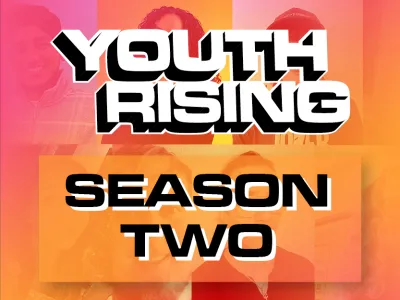
Young Carers Action Day: An Interview With Young Carer Siblings
Include this article in your Skills Builder Journal. It could help you develop... 

It’s Young Carers Action Day, a day that raises awareness and calls for action to increase support for young people with caring responsibilities. A young carer is someone under the age of 25, who cares for a friend or family member who, due to illness, disability, a mental health problem or an addiction, cannot cope without their support. According to the last census, there are 166,000 young carers in England, but recent research suggests that the actual figure may be as many as 800,000, so that’s more like six young carers per class in every secondary school. We spoke to siblings, Sharandeep and Sandeep about what being a young carer is like and how it impacts their lives…
Hi guys, thanks so much for chatting with us. Could you tell us how and why you become young carers and who you care for?
Sharandeep: I care for my blind grandmother and epileptic grandfather. I used to care for my disabled aunt until she passed away. I’m not exactly sure how I became a young carer, I’ve always known that it is my duty to look out for others and help people in any way I can. I think my purpose of being a young carer may be attributed to my sense of being helpful and being able to get involved with activities where people can achieve something and improve their well-being and happiness.
Sandeep: As a Sikh I believe in helping others and doing SEVA which means selfless service. As a young carer I can help and support others when they need it.
What do you do as a young carer? What does your typical day look like?
Sharandeep: I help my grandparents with their health and well-being. I stay with them during school holidays to make sure that they are able to take care of themselves; help my grandmother bathe, wash and iron clothes, etc. During the week, I buy groceries and assist them in visiting other family members so they can socialise
Sandeep: I take my grandmother or grandfather for walks and help them to get to places that they need to go. I also help on the Young Carers Council and help to support other young carers by working with my team to try to make decisions that would benefit them.
Why is it important for people to be aware of what young carers do?
Sharandeep: I believe that young carers are the unsung heroes of our generation. In every generation, there are caring individuals that help look after vulnerable individuals when they can, but may not be proud to share their responsibilities. It is important that these contributions are rewarded and that these carers understand their worth and importance. Across the UK there are around 800,000 young carers who may not even realise that they are,so it is important to make the public aware of these people and their responsibilities so they can get the necessary help.
What impact has being a young carer had on your life?
Sharandeep: I feel like I have a greater appreciation of life due to my role as I notice little details about things like my environment and people which intrigue me. I have developed empathic abilities which allows me to understand others and have a more positive attitude when attempting to solve problems and deal with challenges. Despite facing hardships like being emotionally overwhelmed, I realised how important social support is, like how the Carers Trust provides an outlet to young carers to take a break from the responsibilities and reduce burnout. I have become more resilient and eager to step out of my comfort zone and challenge myself to become better and get more involved in opportunities that are available.
Sandeep: My life has become more oriented to supporting others, I feel more inclined to take care of the people around me. On Saturdays me and my sister make sandwiches that we give to Langar Seva Society who then provide meals for those who need it.
How do you balance being a young carer with your school/college work?
Sharandeep: As I am currently studying for my A-Levels, it is hard to manage my four subjects, being a young carer, volunteering and contributing to many projects. Luckily, I have managed to organise myself and I understand what to prioritise at the moment and what can be completed later.
Sandeep: As a Young Carer and a student, I often don’t find any issue with balancing my life as with my sister also supporting me and those that I care for, I can be at ease knowing that there is someone also looking out for me!
What is the biggest challenge that you as young carers face?
Sharandeep: I think the biggest challenge is being understood. The NHS is known for providing healthcare to the UK but young carers are unrecognised for all the support and economic benefits they provide. As a member of the YCC, I hope to spread awareness about young carers so they can be appreciated for their efforts and support funding so that the Carers Trust can continue providing their services.
Sandeep: That you cannot care for those who you care for all the time. As a student I also need to prioritise my education and future, and that becomes quite challenging when there are people who may require your support.
What skills have you picked up by being a young carer?
Sharandeep: Being organised is one of the most important skills to have in general but it has allowed me to get involved in activities as well as manage my responsibilities. I have developed resilience as I overcome my hardships like being emotionally overwhelmed. As the Head Chairperson of the Young Carers Council, I have further developed my leadership skills and confidence as I present ideas to our team and have to meet with the Board of Trustee to influence decisions that would benefit others.
Sandeep: I have learnt to be more empathetic and understanding of others. I have also learnt better communication skills and supportive skills from helping and caring for my grandparents.
How do you make time for yourself?
Sharandeep: I didn’t realise how important it was to look after myself and then look after others because I was so used to making sure other people’s needs were met before taking care of my own. Luckily, I managed to realise the importance of self-care before I completely burnt out.
You are both young carers, how do you support each other?
Sharandeep: We both agree that teamwork is essential. When we need help, we know that we can rely on each other due to our mutual trust in our abilities and help encourage an optimistic perspective.
Sandeep: Knowing that there is someone there who understands what you’re going through and can support you is vital to maintain a positive attitude.
Where else do you get support from?
Sharandeep: The Carers Trust also runs a service for young carers where they can attend and mingle with others who understand. It is a great example of social support where a solid community has developed and as the Head Chairperson of the Young Carers Council, I plan to ensure that young carers have a voice and their needs can be met by supporting the service.
Sandeep: We also have our parents who can help support us if something serious were to occur.
What are you most proud of (of yourself and of your sibling)?
Sharandeep: Our supervisor nominated me for the Who Cares Wins Award for the Young Hero Category, as me and my brother make more than 30 packed lunches a month for the homeless. I’m proud of my brother for achieving his Speak Out Challenge, the Broken Angels project, being a representative of Sikhism, attending and educating at multicultural experiences, and being a member of the Young Carers Council whilst currently studying for his GCSEs.
Sandeep: I’m mostly proud of my sister and her achievements, she has come a long way and her awards make me very happy knowing that she is being acknowledged for the care that she gives to others.
How can people reading this support other young carers they might know?
Sharandeep: Young carers appreciate support and feel good if their hard work was recognised. If you know any young carers, it would be good to check in with them from time to time to see how they are doing or perhaps invite them to spend time with you so they can relax, have fun and take a break away from their responsibilities to reduce burn out. Even donating money to the Carers Trust would help as they use the fund to continue providing the service to Young Carers.
Sandeep: People can be more understanding of young carers’ situations and be more empathetic to those who have been and still are in these situations. Just being aware is very important as people can direct young carers to the Young Carers services who can offer them additional help.
If you think you are a young carer or know somebody who could be, click here for information on how you can get support.




